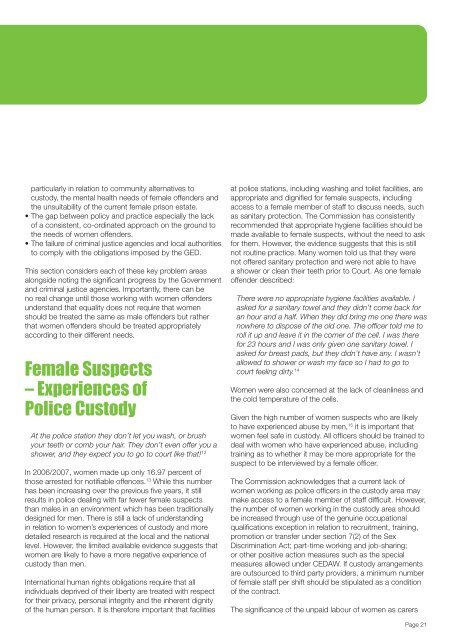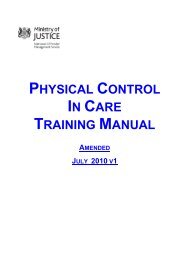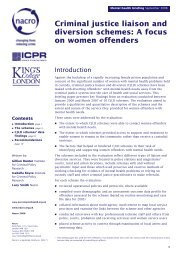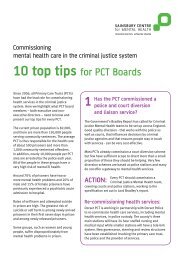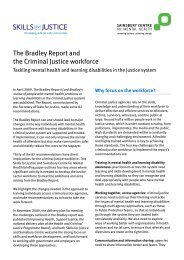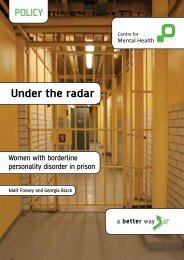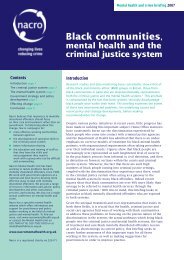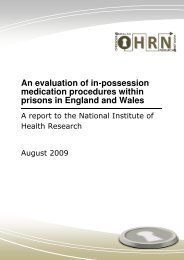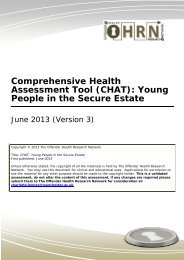Engendering Justice - from Policy to Practice - The Fawcett Society
Engendering Justice - from Policy to Practice - The Fawcett Society
Engendering Justice - from Policy to Practice - The Fawcett Society
- No tags were found...
Create successful ePaper yourself
Turn your PDF publications into a flip-book with our unique Google optimized e-Paper software.
particularly in relation <strong>to</strong> community alternatives <strong>to</strong>cus<strong>to</strong>dy, the mental health needs of female offenders andthe unsuitability of the current female prison estate.• <strong>The</strong> gap between policy and practice especially the lackof a consistent, co-ordinated approach on the ground <strong>to</strong>the needs of women offenders.• <strong>The</strong> failure of criminal justice agencies and local authorities<strong>to</strong> comply with the obligations imposed by the GED.This section considers each of these key problem areasalongside noting the significant progress by the Governmentand criminal justice agencies. Importantly, there can beno real change until those working with women offendersunderstand that equality does not require that womenshould be treated the same as male offenders but ratherthat women offenders should be treated appropriatelyaccording <strong>to</strong> their different needs.Female Suspects– Experiences ofPolice Cus<strong>to</strong>dyAt the police station they don’t let you wash, or brushyour teeth or comb your hair. <strong>The</strong>y don’t even offer you ashower, and they expect you <strong>to</strong> go <strong>to</strong> court like that! 12In 2006/2007, women made up only 16.97 percent ofthose arrested for notifiable offences. 13 While this numberhas been increasing over the previous five years, it stillresults in police dealing with far fewer female suspectsthan males in an environment which has been traditionallydesigned for men. <strong>The</strong>re is still a lack of understandingin relation <strong>to</strong> women’s experiences of cus<strong>to</strong>dy and moredetailed research is required at the local and the nationallevel. However, the limited available evidence suggests thatwomen are likely <strong>to</strong> have a more negative experience ofcus<strong>to</strong>dy than men.International human rights obligations require that allindividuals deprived of their liberty are treated with respectfor their privacy, personal integrity and the inherent dignityof the human person. It is therefore important that facilitiesat police stations, including washing and <strong>to</strong>ilet facilities, areappropriate and dignified for female suspects, includingaccess <strong>to</strong> a female member of staff <strong>to</strong> discuss needs, suchas sanitary protection. <strong>The</strong> Commission has consistentlyrecommended that appropriate hygiene facilities should bemade available <strong>to</strong> female suspects, without the need <strong>to</strong> askfor them. However, the evidence suggests that this is stillnot routine practice. Many women <strong>to</strong>ld us that they werenot offered sanitary protection and were not able <strong>to</strong> havea shower or clean their teeth prior <strong>to</strong> Court. As one femaleoffender described:<strong>The</strong>re were no appropriate hygiene facilities available. Iasked for a sanitary <strong>to</strong>wel and they didn’t come back foran hour and a half. When they did bring me one there wasnowhere <strong>to</strong> dispose of the old one. <strong>The</strong> officer <strong>to</strong>ld me <strong>to</strong>roll it up and leave it in the corner of the cell. I was therefor 23 hours and I was only given one sanitary <strong>to</strong>wel. Iasked for breast pads, but they didn’t have any. I wasn’tallowed <strong>to</strong> shower or wash my face so I had <strong>to</strong> go <strong>to</strong>court feeling dirty. 14Women were also concerned at the lack of cleanliness andthe cold temperature of the cells.Given the high number of women suspects who are likely<strong>to</strong> have experienced abuse by men, 15 it is important thatwomen feel safe in cus<strong>to</strong>dy. All officers should be trained <strong>to</strong>deal with women who have experienced abuse, includingtraining as <strong>to</strong> whether it may be more appropriate for thesuspect <strong>to</strong> be interviewed by a female officer.<strong>The</strong> Commission acknowledges that a current lack ofwomen working as police officers in the cus<strong>to</strong>dy area maymake access <strong>to</strong> a female member of staff difficult. However,the number of women working in the cus<strong>to</strong>dy area shouldbe increased through use of the genuine occupationalqualifications exception in relation <strong>to</strong> recruitment, training,promotion or transfer under section 7(2) of the SexDiscrimination Act; part-time working and job-sharing;or other positive action measures such as the specialmeasures allowed under CEDAW. If cus<strong>to</strong>dy arrangementsare outsourced <strong>to</strong> third party providers, a minimum numberof female staff per shift should be stipulated as a conditionof the contract.<strong>The</strong> significance of the unpaid labour of women as carersPage 21


